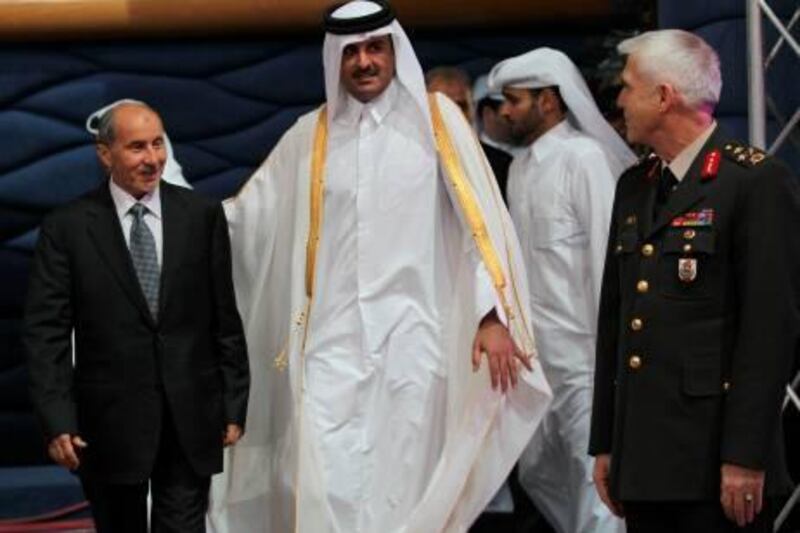Hundreds of Qatari soldiers joined rebel forces as they battled Muammar Qaddafi's troops, a military official said yesterday, shedding fresh light on the extent of the country's military involvement in Libya.
Doha has been at the forefront in supporting the eight-month Libyan uprising, which ended when Qaddafi was captured and killed last week. Along with the UAE, the nation lent the support of its air force to Nato-led operations to protect civilians and was the first Arab country to recognise the rebel council as representing the Libyan people.
But Major General Hamad bin Ali Attiya's comments yesterday at a meeting in Doha of military allies of Libya's National Transitional Council (NTC) mark the first time that Qatar has acknowledged it had troops on the ground in Libya.
"We were among them and the numbers of Qataris on the ground were hundreds in every region," the Qatari chief of staff told Agence France-Presse.
The Qataris had been "running the training and communication operations", he said. "Qatar had supervised the rebels' plans because they are civilians and did not have enough military experience. We acted as the link between the rebels and Nato forces," Maj Gen Al Attiya said.
His comments follow claims that Qatar's military involvement in Libya had gone far beyond the use of its air force in the Nato campaign.
Last week, the Wall Street Journal reported that Qatar had flown 18 weapons shipments into Libya over the spring and summer with the blessing of Western intelligence services. The majority of these went to militias run by Islamist leaders such as Abdel Hakim Belhaj, the commander of the Tripoli Military Council, rather than through the NTC, the newspaper reported.
This has raised concerns among Libyan officials and Western observers that Qatar's involvement in Libya was having a destabilising effect.
"To any country, I repeat, please do not give any funds or weapons to any Libyan faction without the approval of the NTC," Ali Tarhouni, Libya's oil and finance minister and the deputy chief of the NTC's executive committee, told a news conference this month when asked about the Qatari shipments. While Qatar has not said whether it provided the arms, Qatari Staff Colonel Hamad Abdullah Al Marri told the Journal last week that a team of 60 Qataris helped establish rebel command centres in Benghazi, Zintan and Tripoli.
Yesterday in Doha, Libya's new leaders acknowledged Doha's military support. Qatar had been "a major partner in all the battles we fought" Libya's interim leader Mustafa Abdel Jalil told the meeting. He added that the Qataris had "planned" the battles, which paved the way for NTC fighters to gradually take over Qaddafi-held towns and cities. Mr Abdel Jalil, meanwhile, urged Nato to continue its Libya campaign until the end of the year, saying Qaddafi loyalists still posed a threat to the country. "We hope [Nato] will continue its campaign until at least the end of this year to serve us and neighbouring countries," Mr Abdel Jalil, told the Conference of Friends Committee.
Diplomats in Brussels said Nato had decided to delay a formal decision to end Libya air operations until Friday after the NTC's request for an extension and a Russian demand for UN consultations.
In New York, Libya's deputy envoy to the United Nations, Ibrahim Dabbashi, said the NTC may formally ask the Security Council to extend the mandate because a national army has yet to be activated. Nato states have been keen to see a quick conclusion to the campaign that has involved more than 26,000 air sorties and round-the-clock naval patrols at a time when defence budgets are under severe strain due to the global economic crisis.
The alliance has said it does not intend to keep forces in the Libyan region after concluding its mission and has repeatedly stated that its UN mandate is to protect civilians, not to pursue individuals - although Qaddafi himself was captured after his convoy was hit in a Nato air raid.
Gen Attiya, the Qatari chief of staff, said that after the departure of Nato troops, a new international coalition led by Qatar would oversee "military training, collecting weapons, and integrating the rebels in newly established military institutions." The coalition, named as the "Friends Committee in Support of Libya" and which held its first meeting in Doha yesterday, is made up of 13 countries including the United States, Britain and France, said Maj Gen Attiya.
foreign.desk@thenational.ae
With reporting from Agence France-Presse and Reuters






